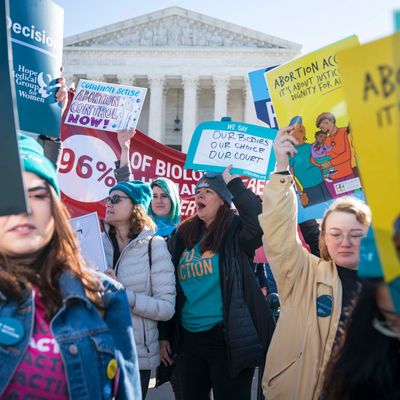
The Supreme Court indicated Monday that it will hear a case on Mississippi’s 15-week abortion ban, giving the new conservative majority its first opportunity to gut Roe v. Wade, which established a constitutional right to abortion. The case challenges a central part of the landmark 1973 ruling that blocks states from banning abortion before fetal viability, generally considered to be around 23 to 24 weeks.
The Court said it will take up Dobbs v. Jackson Women’s Health Organization in its next term, which starts in October and ends in June 2022. The case concerns Mississippi’s Gestational Age Act, which banned abortions in the state after 15 weeks of gestation. The law was enacted in 2018 by then-Governor Phil Bryant and only includes exceptions for fetal abnormalities or medical emergencies. There are no exemptions for abortions in cases of incest or rape.
When the bill was made law, Jackson Women’s Health Organization, the state’s sole abortion clinic, sued immediately. A federal judge first temporarily blocked the ban and later struck it down entirely. U.S. District Judge Carlton Reeves wrote in his decision then, “Mississippi’s law violates Supreme Court precedent, and in doing so it disregards the 14th Amendment guarantee of autonomy for women desiring to control their own reproductive health,” as reported by the Jackson Clarion-Ledger. The Fifth Circuit Court of Appeals later upheld Reeves’s ruling in 2019.
This marks the first time that the Supreme Court will consider a major abortion case since President Trump’s three appointments gave conservatives a 6-3 majority. A significant amount of the opposition to Amy Coney Barrett, the most recent addition to the nation’s highest court, stemmed from concerns on her stance on abortion. As New York’s Ed Kilgore noted recently, though the Catholic justice is “widely presumed to oppose a constitutional right to choose,” she “remains a mystery in terms of her strategic thinking on the subject.”
Though many recent Supreme Court nominees have been vague about their views on abortion rights, Trump was always clear about his intentions for the Court; he said during a 2016 presidential debate with Hillary Clinton that he would appoint “pro-life judges.” When asked whether he hoped the Supreme Court would overturn Roe v. Wade, he said at the time, “If we put another two or perhaps three justices on, that will happen.”






























